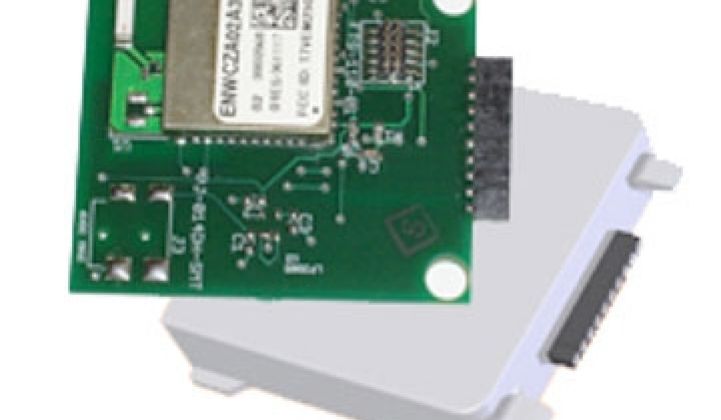In the tug-of-war between competing communication standards like ZigBee, WiFi, Z-Wave and others aiming to capture the market for the smart energy home of the future, a new standard is emerging – all of the above.
That's the idea behind the U-SNAP Alliance, a group of companies that want to build smart thermostats and other home energy monitoring and control devices that don't have one communications standard or another hard-wired into them.
Instead, U-SNAP-enabled devices will come with slots that can be outfitted with communication modules for any of those standards, as well as ones yet to be invented. The concept, which stands for Utility Smart Network Access Port, came out of the California Energy Commission's work on programmable thermostats in 2007.
Radio Thermostat Co. of America got the ball rolling on Tuesday, announcing a new thermostat built on the U-SNAP model, with one slot to accommodate in-home communications and another for communication to a smart meter or another means of linking to the outside world.
Currently, the U-SNAP-enabled CT80 thermostat can come with WiFi modules built with chips from GainSpan (see Get Ready for the WiFi Thermostat). That system can be controlled via a web interface and iPhone application using technology from startup Our Home Spaces.
But the thermostat also will come with modules to let it take commands via ZigBee, the preferred standard for home energy control system makers such as Tendril Networks, as well as the competing Z-Wave standard, said Dan Goodman, chief technical officer for Radio Thermostat.
Radio Thermostat also has modules made by startup e-Radio to let the thermostat take commands via Radio Data System, the system that carries data over FM broadcast signals, he said (see The Latest Players in Smart Grid: Radio Stations).
The company also is working with two smart meter makers to develop modules that can communicate with their proprietary communications systems, he added.
While he wouldn't name the meter makers in question, Sensus is a backer of the U-SNAP Alliance.
Jon Rappaport, home area network manager for the Raleigh, N.C.-based meter maker, said Sensus has developed modules to work with its communications technology.
"The industry has been hamstrung by this waiting for some consensus on protocols," Rappaport said. "As you know, there are just too many options, and the utility industry can't seem to agree." (See The Smart Home, Part I).
Of course, backers of ZigBee may disagree with that assessment. ZigBee has been taken up by a number of utilities doing smart meter projects, and on Monday was by the federal government as a likely standard for in-home networking (see DOE Lifts Smart Grid Stimulus Cap to $200M and this chart).
Still, backers of WiFi such as GainSpan, or those using the Z-Wave protocol, aren't conceding the battle (see Sigma Snaps Up Perennial Smart Grid Hopeful Zensys).
As long as competing standards are out there, offering flexibility will "provide a pretty compelling path for product manufacturers, who won't have to worry about equipping their products with a specific communications interface," Rappaport said.
Goodman agreed that flexibility was key to getting retailers to stock the thermostat, which is set to hit store shelves this fall.
"So I can move this market forward without someone saying, I want ZigBee, I want Z-Wave, or I want WiFi," he said. While incorporating the modular approach probably adds "a few pennies" to the overall cost of the product, the resulting flexibility is worth it, he said.
The U-SNAP concept is being studied by some large-scale appliance manufacturers, which are "impressed by the approach," said John Quealy, manager of equity research for Canaccord Adams.
The risk, of course, is that home energy networking standards will be "hammered down" quickly enough so that appliance makers can safely choose only one to incorporate, he said.
In the meantime, said Ben Schuman, analyst for Pacific Crest Securities, "it's a good way to get a home energy device into a retailer like Home Depot, and still be compatible with multiple utility programs, regardless of the networking technology."
But, he added, "Before this can be taken too seriously, I think we'll need to see more members of this alliance." Right now Radio Thermostat and Sensus are the only two publicly named members of the alliance.
Barry Haaser, U-SNAP Alliance spokesman, said the group has about 100 companies that are interested in joining, including "leading suppliers of thermostats, consumer appliances and other consumer products," though he wouldn't name names.
The concept, which stands for Utility Smart Network Access Port, came out of the California Energy Commission's work on programmable thermostats in 2007.



